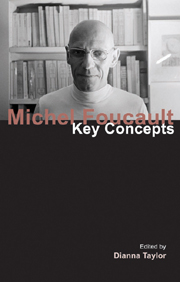7 - Freedom and spirituality
from PART II - FREEDOM
Summary
Spirituality is an idiosyncratic concept in the work of Foucault, which might best be characterized as an “intensity without a ‘spirit’”. To understand Foucault's specific concept of spirituality, we have to take into account some basic themes of his oeuvre, especially of his later work, that is, his books, interviews and lectures since 1976. In this chapter I will first analyse the way in which Foucault uses the concept of spirituality in his early work, a utilization that is inspired by surrealist writers. For this analysis I rely heavily on the work of Jeremy Carrette, who in his book Foucault and Religion (2000) devotes a chapter to this topic. In the second section of the chapter I briefly discuss Foucault's analysis, as found in his “middle” (1970–76) works, of dominant forms of subjectivity in the modern West. This discussion lays the ground for the chapter's third section, which analyses the “exit” status of the concept of spirituality in Foucault's final works. Here I show that spirituality constitutes an ethical self-transformation as conscious practice of freedom. In a fourth section, I discuss Foucault's epistemological claims regarding the relation between spirituality and truth. In the next two sections I analyse his concept of “political spirituality” and argue that this concept offers us a new normative perspective for cross-cultural politics. In a concluding section I illustrate Foucault's idea of spirituality as freedom practice by going into the emerging discourse of Islamic feminism.
- Type
- Chapter
- Information
- Michel FoucaultKey Concepts, pp. 99 - 110Publisher: Acumen PublishingPrint publication year: 2010
- 1
- Cited by



